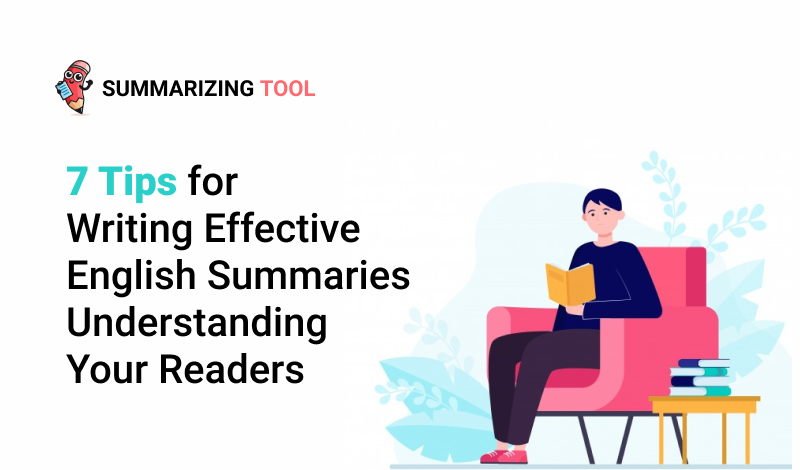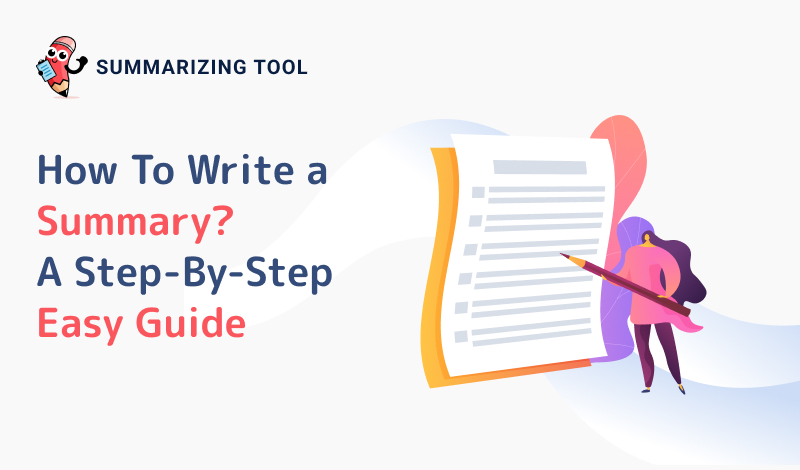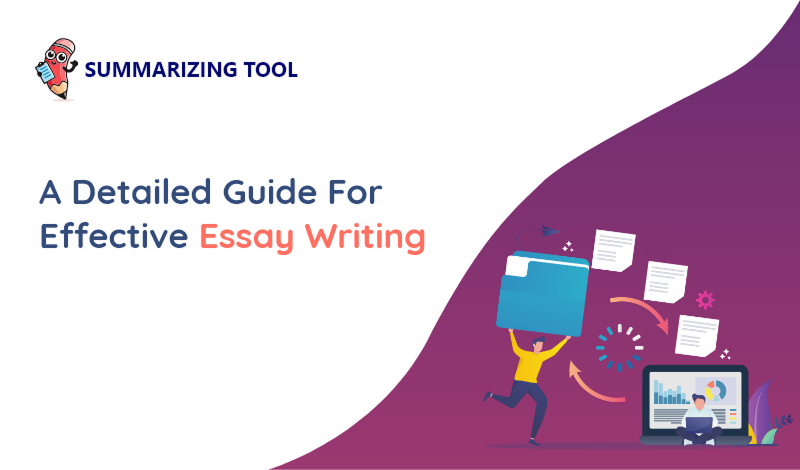
7 Tips for Writing Effective English Summaries: Understand Your Readers
Aug 10Summaries are one of the most important parts of academic writing.
They help readers quickly understand your arguments and they show that you have a clear understanding of what you are talking about.
Unfortunately, Most summaries are not good. Summary sections are just repeating main points without any effort to make them more interesting or engaging for readers.
This is why I wrote this guide to give you some ideas on how to write better English summaries.
7 Exceptional Tips For Writing Effective English Summaries
Here are 7 tips for writing effective English summaries:
Keep Short And Simple Sentences
To write effective English summaries, it's important to keep your sentences short and use simple language.
Create a list of the main points from what you've read or watched in order to create an outline for your summary.
Start by stating who is involved in the story then give a brief introduction before listing each major point that takes place sequentially with enough detail so as not to confuse readers about key events but without being too wordy or technical. In conclusion,
Summarize why this topic matters using one sentence no longer than 25 words which ties all points together nicely.
While including some kind of insightful idea based on personal experience related back to what has been written thus far about the subject at hand.
Be Selective
The best summaries are not just short and sweet, but they also left the reader wanting more.
When writing a summary for an English class assignment you should be selective when it comes to deciding what information is important enough to include in your paper.
The key is cutting out all of the fluff so that only pertinent points remain while still retaining meaning and interest level on behalf of readers by using creative language techniques such as appropriate vocabulary or wording instead of repetitive words like "and" or "but."
In order to write a good English summary, you need to take care not just in what you say but how. The main objective is that it is clear and concise so the reader doesn't have any difficulty understanding your message. Summarizing tool could be a good option to have a high-quality summary, this tool consider using strong verbs as well as making sure there are no run-on sentences when summarizing information from different sources or paragraphs of text.
Clear Writing
Remember that good writing helps you be clear and concise
It is important to use the English language in a way where one is able to articulate their thoughts.
Taking time before pressing publish on an essay or online post can make all of the difference for how readers will see your message, so it pays off to write well.
In a nutshell, you can summarize this passage by saying that in order to write an effective summary of something for someone who has never been exposed to it before.
Your job is not only summarizing the information but also making sure they will not be lost. Your language should also match their reading level so as not to bore them.
Determine Your Purpose Before Starting Out
So, you're writing an English summary? Before making any decision on how to write it out, make sure that the purpose is clear.
Is this for a class or personal use? Do you want your readers to know all of the intricate details in order to be able to get into and enjoy reading about what is happening now without missing anything important from earlier events?
If they do not read them first , or do just enough so that someone can understand characters' motivations and relationships with other people/characters.
Knowing why one will read something helps determine which style suits best!
Create Suspenseful Sentences With Drama
Mastering the art of writing suspenseful sentences with drama can help you write effective English summaries.
One way to do this is by using direct and strong language like, "The plot thickens!" This technique will create a compelling story that hooks readers in from the start.
Another trick for creating suspenseful moments is describing something's passage or movement as if it were an event happening right now, "He stares at her incredulously."
The reader begins wondering what he does next. It also helps to use words such as "dashing," since they evoke more excitement than synonyms such as running or walking fast would.
Dramatic sentence structure makes all these elements work together beautifully.
Try adding exclamation points!
Pay Attention To key Points
Pay attention to key points especially those without detail in order to write a more effective English summary.
But many aspects of life are difficult to measure.
One way researchers can get around this is through qualitative research which often involves lengthy interviews, focus groups, or fieldwork where the participants tell their own stories and share experiences in full detail.
This allows for a more thorough understanding about what they truly experience on an everyday basis that may not be captured by quantitative data alone.
Use Memorable Phrases As Transitional Devices
Add memorable phrases to your writing for a more effective, creative summary.
In order to write an engaging English summary, you need some sort of transition that will make the reader want to continue reading.
You can do this by using funny or interesting quotes from famous people into your sentences and paragraphs in order to create transitions between thoughts during a piece of literature's plot line with which they are familiar.
So readers anticipate what is coming next and enjoy reading it even more than usual because they know where each sentence leads them without having had any previous knowledge about the work beforehand.
Why use transitions? Transitions make texts more readable and forceful. The key is to transition smoothly without disrupting the flow of ideas.
Transitioning between sentences can be tedious, but it is an important task for writers who want their work to seem seamless or "flow" from one idea into another seamlessly.
A process that will create engaging writing in English summaries!
Frequently Asked Questions
How make your summaries more effective?
The most important thing to do when summarizing a book or research papers is not just reading, but also thinking about the text.
Summaries are different from reviews because they are based on what happens in the story and how you feel as opposed to whether or not it was good enough for your tastes.
What should I be looking at?
The protagonist's journey through life might reveal something more than their personality so pay attention!
What are common techniques for effective summaries?
One way to summarize a passage is by condensing the text into one or two sentences.
A summary paragraph can be written as if it were an abstract, which briefly summarizes what was discussed in greater detail elsewhere and sets the tone for future discussions on that topic.
Skimming through passages of text with your finger may help you identify sections that are not relevant but need to be summarized more concisely before moving onto other parts of the reading material or points made there in.
What should be avoided, when writing an effective summary?
A poorly written summary can be misleading and misrepresentation for both the writer and reader as well as lead them down false paths while they're searching through their memories trying to recall what happened when reading your piece.







